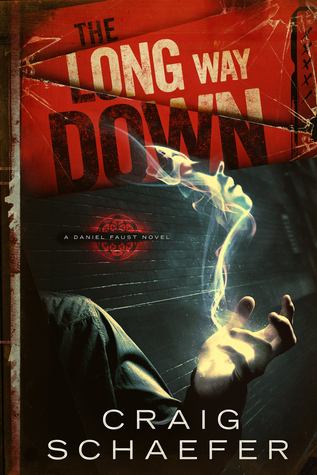
I drove to the address I hoped was Tony Vance’s house. I didn’t pray, as a rule. If there was a God, we weren’t on speaking terms, and I didn’t think either of us cared what the other had to say. Still, pushing the pedal hard enough to make the engine whine, streetlights strobing across the dirty windshield, I was tempted. Then I remembered God’s track record when it comes to helping out little kids.
“If you don’t like how the universe works, take it up with the architects.”
I definitely enjoy some philosophical blasphemy, but I didn’t expect to find it here.
I picked up this book at some point in 2018, and read it fairly quickly, up to 60 pages from the end. Then I stopped. Why? Because I was burned out writing here for this blog. I ended up in this weird situation where to be able to write something meaningful about a book, then it had to be fresh in my memory. I need to struggle for at least a couple of hours, no distractions. If even more than two days pass between me finishing the book and starting to write, then the task becomes much harder. The solution was trying to align me reading the last 50-60 pages with me having enough time and mental clarity to write about it. As it happens with bad habits, finishing to read a book became more an annoyance than fun. So here we are.
In order to say what this is about I need to explain why I decided to pick this up. It’s a plate-cleansing, guilty-pleasure kind of read, I’m quite sure it’s self-published and printed directly by Amazon, and it’s urban fantasy. That makes it at least atypical when it comes to the stuff I normally read. But it wasn’t quite an exception as it may appear. I saw the author mentioned here and there, and the book is first on a series that seems to hold well, when it comes to readers’ feedback. The last (and only?) book I read similar to this one was “Hounded”, and from what I’ve seen the ending of that series wasn’t that well received. Of course looking at averages on Goodreads isn’t proof of anything, but it gave me an idea that is like drug for my type of mind: a starting point, and the possibility that it could only get better from here.
What I’m reading would be the baseline. Because the real deal, and the one reason why I decided to read this book (twice!) is that there’s… more. This book came out in 2014, but it is part of a larger project that is somewhat structured like Marvel comics in the 90s. There are at least two ongoing series sharing an universe, and even a couple of crossover events. Daniel Faust himself is the protagonist of this book, and his own series. This alone is currently at 10 books, and it’s not done. Each book should be a self contained story, but of course it’s all pinned onto a grander scheme. As you can see from that reading order I linked, 20+ books are already out.
This book by itself is not especially ambitious, and describing its structure in detail is important to understand what it actually is. The book is 366 pages long, but it uses such an oversized font that this would give the wrong idea. All ten books in the series are almost precisely the same length: averaging around 86k. At 400 words on each page, which is a standard I use, it translates to a 215 pages book. Divided into 44 chapters. This makes it a very fast read, turning into an addicting formula because the prose is proactive, terse, smooth. The moment you finish a chapter you already observe yourself starting the next before you even considered stopping. It’s, as the way of saying, hard to put down.
It is also very close to a TV series that I enjoyed watching, up to the third season since with the fourth all main characters got brutally maimed (metaphorically): Lucifer. But the reasons why I like that series are quite weird, so this isn’t telling much. It’s still fairly similar both in tones and execution. It’s set in present time Las Vegas, there are magicians, and a varied underworld of demons and whatnot. Rather than picking a specific flavor of the magical, it seems the setting is a kind of “all-in”, but well realized, despite the limited scope of a small book only paints a very vague cosmology.
The protagonist, Daniel Faust, has some nice swagger that doesn’t get annoying. A bit of a typical anti-hero, with some unconventional takes that make it all less boring and trite, but in the end so much of a very good person that it becomes even too sweet. But it’s fine. There are some companions that don’t do a whole lot, but that help giving it more of a choral atmosphere, and when it happens it adds a lot more. It expands the scope of a personal story, and by the end of the book what started as an homicide investigation with very mild supernatural connotations gets promoted to world-ending catastrophe. Some of it is clumsy, but it gets a pass because the reading is kept always fun and going at a brisk pace.
This was essentially my second read, since I couldn’t remember much and so I started again from the first page. It’s quite funny because with mathematical precision after one or two pages into a chapter I recalled what happened in it, but only that little bit and not more. I was basically spoiling myself chapter by chapter, but it didn’t subtract much from the fun of reading. My vague memories amounted to two different halves that seemed to belong to two separate books, and in the end this isn’t far from the truth, since the story shifts toward the middle point. There is a deliberate tonal shift that feels a bit jarring because up to that point the book stayed within a definite “range”. Since it is a fun, casual read, it has humor and only dips a toe into more serious themes. Then there’s this tonal shift that is even more jarring when it shifts BACK into more laid-back, action-powered scenes. I perceive it as a flaw, but it also contributes to a roller-coaster feel, since so much happens within a low page count.
(Oh, and you probably want to skip reading the back cover summary, since it spoils a good 3/4 of the whole.)
So what is it all about? It comes down to these two points. The first is about the connections. The feel of being part of something more. When I was reading Marvel comics in the 90s, I would enjoy some poorly written, very minor stories just because the shared continuity made the whole so much more than the single parts. Characters were part of a family. When you engage with a larger design it’s always interesting to indulge even in the smallest corners of the canvas. It’s the same reason why the Warhammer 40k books side fascinates me. It’s like an almost endless delve, full of discoveries, all contributing to a larger whole, even if often in a clumsy way. By reading it piece by tiny piece, you slowly realize it. Some of this can already be felt in this first book. Names and figures that aren’t just thrown away, but that wait there to eventually get their spotlight. The fact that the protagonist is the focus of the story, but he’s not alone. That it builds up and becomes more coherent, that throws nets to the future and retrieves links from the past. If this book was purely a stand-alone, it would lose a lot of its efficacy and charm.
The second aspect is the style of the story, that comes alive in a fairly vivid, honest way. The author came out as trans not long ago, so years after I picked up the book. But this book from 2014 is already a bit “queer”. And it does it elegantly without even making it a point. It’s curious that the crossing of silly cultural boundaries here involves crossing species, of course. And it follows it all up with well placed humor. After all, I educated myself about the evils of racism from reading the X-Men. Fantasy is earnestly liberating, especially when it engages with the real. It’s not a contradiction, it’s what fantasy is at its root.
While rummaging through some random Goodreads comments I found this:
Ok Carol I so love the Dresden Files, everything else urban fantasy I read doesn’t even come close. Is this as good as Mr. Butcher’s series?
Better, because women are actually, you know, people and gay people are people, and wizard are just people, and everyone’s just people. Except the demons, and even some of them are people.
The original direction of this review was going to be slightly more scathing, but I instead opted to just promote the better series. :D
You know how sometimes you think about a book that you’ve read and love it more? When I think about Harry Dresden, I like him less and less. I’m still riled about the opening chapters of The Skin Game and the ‘not-that-theres-anything-wrong-with-it’ of Cold Days.

